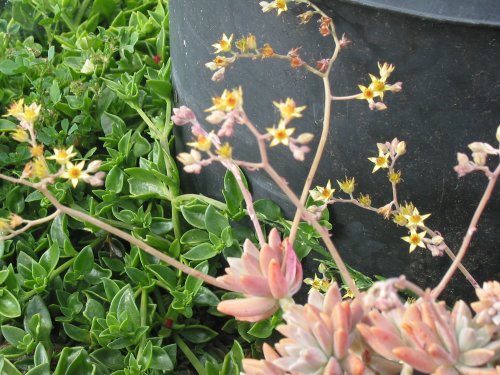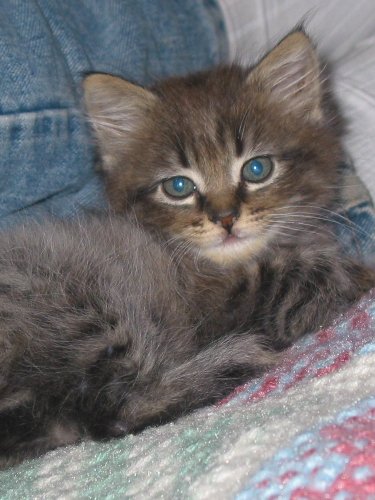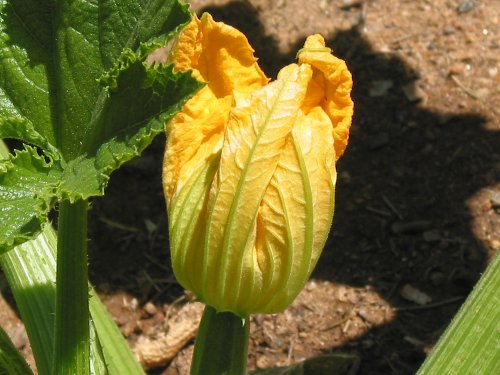May 30, 2008
Mystery author Eric Mayer* mentioned in a recent blog post that his blog journaling hasn’t been very habitual of late. He went on to write about habits, and that got me to thinking about my habits, and how they’ve changed in the past year or so. Obviously, for me, blogging has taken a back seat to other things. So has my fiction writing, other than attempting to sell my latest finished manuscript, a mystery about a tarot reader whose awakening ability as a medium gets her involved in a murder investigation. (Interested agents or publishers are welcome to inquire here.)
Habits can be good or bad, and I’m sure everyone has some bad ones they’d like to unload. But one new habit I’m happy to have taken on this year is gardening.

Gardening is indeed a habit, one that gets into your blood in a way I didn’t anticipate when I started out this year. I’d done a tiny bit of gardening as a kid, when I remember planting one rose bush of my own but mostly helping my grandmother with her strawberries and vegetables on the embankment behind my parents’ house. Later, in my first apartment, I nurtured a few houseplants, and throughout my work life I’ve usually kept a potted plant on my desk. I kept African Violets in a north facing window in the last house we rented, until a cat took over that window sill. Still, my husband did most of the outdoor gardening, with a little weeding here and there on my part, until March of this year.
It started this spring with tending a few vegetable and flower seeds until they sprouted, and then the seedlings until they went into the ground. From there I progressed to caring for plants in the ground and preparing the soil for more of them. It’s rapidly expanding to a succession of all of these things, in the hopes of keeping some fresh produce in our salad and veggie bowls through this summer, as well as brightening a corner of the front yard, where my ultimate goal is to keep flowers blooming in a little cottage style bed year round. I’m a ways from that goal yet.
I’m still new at this, and I got a late start this year, but I get help and advice from various sources, and gardening is now a firm habit that I won’t easily give up. It’s one of the first things I think about in the morning and one of the last I think about before the sun goes down.
The plants seem happy about my gardening habit, when they can figure out what season it is. Our weather this spring switched back and forth for a couple of months from one extreme to the other, first dry Santa Anas with temperatures in the 90s, and then thick cloud cover and a shifting Jet Stream chilled the air to the 50s. This went back and forth for weeks, with little pleasant weather in between, and it kept our plants confused. In the past two weeks the weather has leveled off, and the plants are loving it.
They say beauty is in the eyes of the beholder, and I’ve recently realized there’s little more beautiful to me than a tiny plant bursting out of its seed container. Call me crazy, but I think baby plants can be almost as cute as a kitten, and they, like the kitten, draw out my mothering tendencies.

(I’ll bet you expected a photo of a seedling, but I couldn’t help the obligatory kitten shot.)
To some this pleasure might seem like taking joy in watching paint dry, but to me it’s more like watching a sunset at the end of a heat wave.

We celebrated our first avocado blooms a few months ago.

Now some fruit has set, which we hope will grow to maturity.

Avocados, according to my resident expert Ken who’s read something like 200 online agricultural reports about them, tend to drop a good portion of their fruit early, which can be disappointing to home gardeners. It will be disappointing to me, if it happens, because Reeds are my absolute favorite avocado variety.
Two days ago I celebrated my first squash blossom.

Zucchini may seem an ordinary thing to seasoned gardeners. It’s one of the easiest things to grow and the butt of gardening jokes, usually in reference to an overabundance of it. But I like zucchini, I love my resplendent squash plants with their huge green leaves, and those yellow-orange blossoms are gold to me.

I’m learning more about the various weeds that grow in the garden, some of which are edible. For instance, purslane and dandelion make delicious salad greens. Note, if you decide to try eating weeds from your garden, be careful that you know what you’re eating. Ensure that the plants haven’t been subjected to herbicides or pesticides and that they aren’t in fact toxic weeds.

Even some semi-edible weeds, like the sour grass we all discovered as kids, can be a problem if eaten in quantity, I’m told, and purslane looks very similar to a toxic type of spurge that often grows right alongside it. Have an expert show you how to identify edible weeds, and examine carefully whatever you pick to eat. This point was driven home to me when I found spurge, with its milky sap, growing in my own little purslane patch.
Yesterday Ken pointed me to a Los Angeles Times article about Guerrilla Gardeners, which linked to a slide show on how to make “seed bombs” as well as two blogs, here and here, about guerrilla gardening.
Gardening has not only revolutionized my daily routine. It’s apparently a revolution that’s spreading once again, as Victory Gardens did in the last century, with people today gardening to save money on local food and working on a clandestine volunteer basis to re-green the land.
_ _ _
* In case you aren’t aware, Eric Mayer and Mary Reed’s latest John the Eunuch Byzantine mystery, Seven For A Secret, was released in April by Poisoned Pen Press. If you haven’t kept up with their historical mystery series, it’s not too late to start. The earlier books in the series are still in print, and some are now available as Kindle editions.
— Barbara @ 3:27 pm PST, 05/30/08
September 20, 2007
Bruce at Wordswimmer writes about story endings in his post, Where the River Ends, and that got me to thinking about some of the problems I’ve encountered in ending mysteries.
With a mystery, the question of how to end the story begins with which character did the crime. I no longer start with a specific villain in mind. The story often changes so much in the writing that a pre-planned ending has no choice but to change as well, or it wouldn’t make much sense.
In the last couple of mysteries I’ve written, I was as surprised as anyone by who the villain turned out to be once I got to the second draft or later. That’s okay, and it has a lot to do with how I develop characters. If I know who the villain is too early, I’m in danger of giving it away, offering hints I’m not even aware of because of my judgments about that character.
If I start out thinking the villain isn’t a villain, I can get to the heart of that character sooner in my own mind. I can get to know him, let him grow and round out on the page. I’m an idealist, and I really like to see the best in people, so there needs to be that spark of sympathy first, without letting on even to myself that he or she is a killer in the making. I guess in that regard my characterization is as organic as raising a child. What mother imagines her infant would harm anyone?
This process forces me to explore the shadows, my characters’ shadows as well as my own, to see possible motivations, both conscious and unconscious.
I first encountered the shadow, as a human concept, in stories I read. I confess that I didn’t understand the concept very well when I was young and still in denial that I had a shadow or that any good person did. But one encounters this idea many times, if one reads at all widely, and the reason for that is it’s a universal truth about human nature.
In exploring the shadows, I’ve come to see that a fully rounded character, even if he’s the good guy, has a shadow, whether that shadow is clear on the page or not, whether that shadow is negative or positive. I want to know each major character’s background as well as possible, so I start with the positives and work my way into the negatives. Though it hurts me to watch a character I’ve come to like or sympathize with cross the line into murder, at least the biggest puzzle of the mystery isn’t lost on me, and I’m not giving the killer away up front. If I decide the murderer needs to be someone else, not the person I thought it was going to be, I don’t have to cast about too far for someone else who could have done it. In truth, any one of the characters might be capable of killing, given the right circumstances and motivation. They all have their shadows. By the time I get to my final draft, I usually have a few characters that, with nudges into poor choices and flawed rationalization, could become much darker individuals. That’s usually a key to how I end the story. Which character, which nudges, and which choices? Which fits this need best? What motivates the villain to do the awful deed and also causes him or her to get caught in the end? How will the reader be surprised and at the same time see that this person and the clues leading there were present all along? (Foreshadowing will have to wait for another post.)
My exploration of the shadows has made me think a lot about the choices we make in life, and how important each one is, especially when we stack one choice on top of another in the way that we sometimes come to think of as inevitable. We don’t have a choice in everything, certainly, but sometimes when we look back over our lives or a course of events, we can see the turnings we’ve made, and many of them were choices, that brought each of us to be who, where, and what we are today. When we’re accountable for those choices, I think we improve our ability to move forward and make better ones.
If there’s one positive effect fiction can have, perhaps it’s to get us to take a look at the cause and effect of choices. What are we capable of? What would we do in the same situation, and where might that take us or what might it make of us, and our world with us? The stories that get me to think in those terms are the stories that stay with me.
— Barbara @ 1:13 pm PST, 09/20/07
August 14, 2007
I hate writing synopses.
As I understand it, most writers hate them. It’s difficult to pare down to a few pages the story that took you many hundred more to write in the way you think readers will best understand. It’s especially difficult for me while all the minute details and nuances are still very much alive in my mind. But agents want to see a synopsis first.
Some writers say a synopsis is easier to write before one writes the story, but I’ve always found that tricky, since my stories change as I write them. I outline the story that it turns out I didn’t want to write after all. The real story reveals itself as I go along.
But this synopsis may turn out to be a good thing, because it’s helped me see more that I want to cut. Maybe that’s what the agents really have up their sleeves, getting writers to analyze their stories from a different perspective. I’m heading back into editing mode. Good grief, this novel’s been through a lot of drafts. This will be the 9th, and it’s wearing me down. I’ll be glad to see the end of it.
— Barbara @ 2:15 pm PST, 08/14/07
July 5, 2007
I decided to answer your comments in a new post, since some of my responses are lengthy. You’ve given me a lot to think about and helped me reconsider my feelings about critiques. Even though I disagree with some points, as they relate to my writing at this time, you all shared wisdom that deserves attention. (more…)
— Barbara @ 7:33 pm PST, 07/05/07
April 13, 2007
Has it been more than a week already since I posted? I lost track of time during my panic of the past few days. The other night, after a glitch occurred when I ran my backup program, I thought I’d lost all my files for my current book in progress. Panic ensued, while I scrambled to find and undelete the files. I spent almost 24 hours straight on that, with little sleep, piecing together fragmented files, hoping I still had a complete book there. Finally I came across the directory on the backup computer where my backup program had stored a complete second archive of everything — perfectly intact and up to date, including every last minute of my work on the book.
All that panic because I was too dumb to know my backup program stored an archive of deleted files, and because I had allowed too much other garbage to backlog on my hard drive. (The glitch occurred when that particular hard drive filled up.)
I could sit here and ask why me, or rather ask why I do this to myself, but I’m too busy getting back to normal and on with work. Still, it seems that I go through this sort of panic on a regular basis. It happened two years ago when my old laptop gave out and I lost work that I hadn’t yet backed up. This time it resulted from the backup process itself.
Once I’m finished with this book and it’s off getting a look by some agents, I plan to spend a few weeks getting my life in better order, including both paper and digital files, to prevent future panic episodes.
But one thing I noticed during all of this was that I don’t tend to print out what I’ve written as often as I used to. In spite of what might’ve been lost, overall I consider that a good thing, a good sign that I’m making my personal transition from paper to a digital world.
I admit to some affection for the paper world. It’s what I grew up with, and where I found my love of books and the written word. There is still something sensual to me about the feeling of pen and paper or a book in my hands. I like the shape of the book, the weight of it, the toothy or smooth texture of paper, even the smell of ink, paper, and binding materials. I still recall with nostalgia the particular smell of the book I was handed in third or fourth grade when we studied the culture and geography of Japan. Ever since, I’ve looked for similar qualities each time I open a new book. All these things make letting go of the paper world a clingy process.
At the same time, I love trees. Because of that, I’ve always been troubled that my chosen form of expression — writing — has a history of felling so many trees. So when I went through my computer files and some paper files over the past few days, I was pleased to realize that I recently have less tendency to print as I write. I used to feel a need to print out what I’d written more frequently, to edit or proofread on paper rather than onscreen, or just to get a sense of what the printed story would look like.
Maybe it’s so many years of writing on a computer that’s changed this. Maybe it’s the laptop’s portability and reduced glare being easier on my eyes. Maybe it’s no longer having a job that requires me to stare at a screen all day and then do the same all my evenings and weekends for my fiction writing.
Maybe it’s blogging. The immediacy of blogging tends to encourage me to edit onscreen. My blog is even set up now so I can view what I write in two or three different fonts before I post it, which I think aids the onscreen editing and proofreading process.
Maybe it’s a combination of all those factors. It’s interesting to note that more publishing venues have opened up to electronic submissions just since the CRT monitor has begun to vanish. Hopefully the less glaring monitors that are replacing them will be much easier on all our eyes, and continue to save more trees.
I still write a good half of my personal journal pages by hand, and I still use handwriting to jump-start or unblock my writing process. This blog post is in fact a segue from my morning pages. But my journal pages don’t get reproduced, except by typing them into a digital format, and they’re unlikely ever to be published in book form. The paper is eventually recycled if they do become digital, so I’m not as concerned about my journal pages killing trees. At least that’s what I like to tell myself.
Now if we can get the ebook technology to the point where fewer paper books have to be printed, at least for popular fiction, then we’ll have made real progress in taking publishing from deforestation for profit to a more pure form of edification, expression, and entertainment. Of course there will always be uses for paper. I can’t think of a better way to keep certain legal documents or accounting records, right now, though that’s not a world I work or have much expertise in. There are also some types of books that just work better, for now, on paper. One that comes to mind is the coffee table variety, with color plates of artwork or photography. But the less trees cut down for paper and books, the better.
Even if what this Guardian Unlimited article says is true, that planting more trees in temperate latitudes won’t help assuage global warming, it also states that destroying more trees isn’t the answer, that the greater need, and indeed our motivation for attempting to slow global warming, is to preserve ecosystems, including but certainly not limited to our own.
Perhaps my panic over my files had some value. It got me not only to change what I file away on my computer and how I back it up, but also to take a hard look at how I use paper, to keep heading along the road I’ve started down, of conserving wherever it’s reasonable, and wherever I can.
— Barbara @ 2:16 pm PST, 04/13/07
September 29, 2006
I’m in what I hope is my next to final re-read of my novel before I start submitting it. I’m attempting to just read, without editing, to get a feel for how the reader will receive it.
I loved to read, as a girl and a young adult. I still do, but I often wish I could read the same way I did back then. Once you’ve been a writer, editor, or proofreader (and I’ve been all of those), it becomes nearly impossible to just read, without editing or analyzing or noticing parts of speech. I can barely make it through almost anyone else’s writing anymore without wanting to stop and edit, or at least correct a typo here and there, or think about some aspect of it besides the story being told, the information or advice being relayed. Plot structure, characterization. Wondering why the author did that, or admiring a description rather than staying in the story.
It’s even worse with my own writing. No matter how many times I’ve been through it, no matter how good anyone else thinks it is, I find it impossible to just read what I’ve written. I’ve heard that near the end of his life Ernest Hemmingway could barely compose a single sentence, he’d become such a perfectionist about his writing. But, I wonder, how was he at reading? That’s the thing that kills me.
It’s a mad dance with myself, trying to read this book. But I hope that as I read through this draft, if I can distance myself enough from it, I’ll see it more the way other readers will. I also hope to come to a final decision about a title for this book. Finally I hope to see the big picture of the story, and notice any gaping flaws or errors in logic, rather than the little nit-picky things I’ll focus on the final time through.
— Barbara @ 12:55 pm PST, 09/29/06
May 10, 2006
I’m internalizing a lot right now, I guess. I haven’t been blogging, and it’s not a reflection on my ideas, or my fellow bloggers, or commenters, but just that I’m internalizing and letting my thoughts gestate right now. Working on the novel, tweaking, tying loose ends, all that fun stuff.
Funny how we go through times like this. Lots going on inside, not much coming out (in the blog).
I’m sure that as soon as I’m done with this little fallow blogging period you’ll be hearing a lot more from me. Meanwhile, when I am online (haven’t been much lately) I will try to get around and visit you all more and make sure I comment. Happy blogging!
Meanwhile the cat wants dinner, it feels like spring today instead of winter, and we have a new neighbor, called Phainopepla, who is really quite awe inspiring and graceful.
— Barbara @ 4:11 pm PST, 05/10/06
April 23, 2006
I’ve decided there are three kinds of writers when it comes to word count. Those who wind up with too few words, and those who wind up with too many. Then there are those fortunate souls who write just the right amount.
I’m in the second category. I’m a wordy writer, and it frustrates me to see how many extra words I write. If I’d been able to keep my words in check, the story surely wouldn’t have taken so long to come together. Or would it? Why this need to expand so much on what can be said with so many less words? (more…)
— Barbara @ 4:05 pm PST, 04/23/06
March 10, 2006
A recent Washington Post column queried Bloggers on the Reasons Behind Their Daily Words. Reading it got me to thinking yet again about why I blog.
I started my website back in 2000, when Shadows Fall was first published, for the same reason most writers do, to promote my work. Four years later I started this blog as a way to provide up-to-date content on my website and let visitors know what I was working on—basically as a way to keep the website from stagnating when too much time passed between novels. Little did I know at the time that the blog would engage so much of my attention.
The immediacy of this format holds a certain attraction. Type, click a button, and what you’ve written is published. But that has its drawbacks. As easy as email, which carries its own risks, a blog can suck you out into public view in a way that’s scary and in some ways deceiving. It’s easy to forget you’re putting yourself “out there” to the degree we do online. After all, I’m seated here alone at my home computer as I type this into a little window on my screen. It doesn’t feel public at all, at the time I write. (more…)
— Barbara @ 2:55 pm PST, 03/10/06
February 19, 2006
There are times when dialogue seems to come by means of mental torture and pretzel twisting, and to be the most difficult writing I do. I continue to learn. In reading through my second draft, a few weeks ago, I checked for those places where the story dragged or faltered, and I found those were often the same places where dialogue stumbled or rambled on too long. Nothing much seemed to be happening, even though something was, because I’d buried it inside too many words.
I got lost in the accompanying narrative, the setting, the characters’ activities, movements, body language, or overwrought cleverness. Sometimes I bogged down in the minutiae of sighing, nodding and eye gazing. Writers can get so caught up visualizing each detail of character interaction they rob readers of their mental interplay, their own visualizations based on common human experience. We presume readers don’t know how a character might deliver a line in a given situation. The stream of dialogue reads as dammed up where it should flow. It loses its surface tension, its sparkle, and its undercurrent. It becomes stagnant.
(more…)
— Barbara @ 10:39 am PST, 02/19/06










